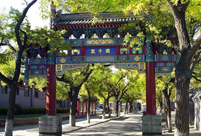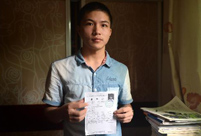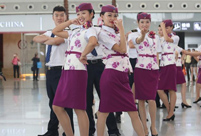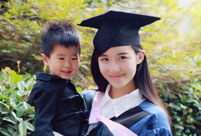 Global ambassadors of ecotourism gather in Nanjing
Global ambassadors of ecotourism gather in Nanjing
 Taiwan woman marries into Kazak family, 100 sheep plus a flat as dowry
Taiwan woman marries into Kazak family, 100 sheep plus a flat as dowry
 College girls take graduation photos under water in Chongqing
College girls take graduation photos under water in Chongqing
 Cartoon: Xi and football
Cartoon: Xi and football
 Chinese influence sweeps ROK
Chinese influence sweeps ROK
 Post-90s beauty boxer grapples four men
Post-90s beauty boxer grapples four men
 3,000-year-old tea town through lenses
3,000-year-old tea town through lenses
 22 archaeological sites along Silk Road in China
22 archaeological sites along Silk Road in China
 Football babies, Samba dancers embrace 'World Cup'
Football babies, Samba dancers embrace 'World Cup'
 Beautiful scenery along China’s Grand Canal
Beautiful scenery along China’s Grand Canal
GENEVA, July 3 -- The fifth World Trade Organization (WTO) trade policy review of China concluded here on Thursday, with WTO members commending the vital role of China's economic growth to the world economy and some also raising higher expectations for China to assume more responsibilities.
During the two-day review with the first session held on Tuesday, WTO members conducted a collective evaluation of measures of the comprehensively deepening reforms launched by China's new leadership, and the full range of China's trade policies and practices and their impacts on the functioning of the multilateral trade system.
Having presented to members China's trade and investment development in the context of carrying out its reform agenda, Wang Shouwen, head of the Chinese delegation and assistant minister of Commerce of China, delivered responses on Thursday to the statements made during the review sessions from over 40 WTO members, including the United States, the European Union, Japan, Brazil, India, South Africa and Russia.
As for concerns raised by members in their statements regarding issues such as the relationship between Chinese government and market, transparency, consistency in implementation of laws, regulations and polices, China's support policies, and the use of trade remedies, Wang replied in details and clarified certain misunderstandings.
It was noted that China has received around 1,600 written questions from 30 WTO members in advance of this year's review, a reflection of China's increasing importance in global trade.
Mariam M.D. Salleh, the Chairperson of the Trade Policy Review Body and Malaysian ambassador to WTO, said in her concluding remarks on Thursday that "the fifth trade policy review of China has provided an excellent opportunity to improve our understanding of its trade and investment policies," commending this review as a "successful" one.
"Members noted the role that China's economic growth had played in contributing to world economic recovery in the aftermath of the global financial crisis," said Salleh, adding that members also commended China's determination to carry out reforms.
China, the world's largest merchandise trader and second largest economy, also got praises for their efforts and progresses in implementing the new trade facilitation agreement and opening its markets to products from the least developed countries.
Given the size of China's economy and the impact of its policies to the world economy and the functioning of WTO, some members expected China to play a leading role in the multilateral trade system.
In this regard, Wang said that behind the two high rankings was the fact that China is still a developing country, facing daunting tasks in maintaining sustainable economic growth.
"Therefore, China would actively participate in the multilateral trade negotiations and assume responsibilities commensurate with our level of development, competitiveness of our industries and level of people's income," he said.
Wang said that China looked forward to work with all to smoothly implement the whole Bali package, to successfully formulate the post-Bali work program, and to fully conclude the Doha round towards a multilateral trading system that is more balanced and development-oriented.
Trade policy reviews are an exercise, mandated in WTO agreements, in which member's trade and related policies are examined and evaluated at regular intervals. Significant developments that may have an impact on the global trading system are also monitored.
All WTO members are subject to review, with the frequency of review depending on the economy's size. The United States, China, the European Union and Japan are reviewed every two years.
 Featured hutongs in Beijing
Featured hutongs in Beijing Separate college entrance exam
Separate college entrance exam Flash mob dance
Flash mob dance Picturesque scenery of Ghost City
Picturesque scenery of Ghost City Children attend First Writing Ceremony
Children attend First Writing Ceremony Female master poses for graduation photos with son
Female master poses for graduation photos with son Silk Road, China's Grand Canal listed as World Heritage Sites
Silk Road, China's Grand Canal listed as World Heritage Sites PKU students imitate famous paintings in real-person photos
PKU students imitate famous paintings in real-person photos Chinese 'Slumdog Millionaire'
Chinese 'Slumdog Millionaire' Islands in S. China Sea better shown on new vertical atlas of China
Islands in S. China Sea better shown on new vertical atlas of China Girl takes father’s portrait to travel the world
Girl takes father’s portrait to travel the world Images of Xi'an: Part one
Images of Xi'an: Part one In Pictures: Female fans of World Cup
In Pictures: Female fans of World Cup Top 20 hottest women in the world in 2014
Top 20 hottest women in the world in 2014  China's top 10 representative architectures
China's top 10 representative architecturesDay|Week|Month